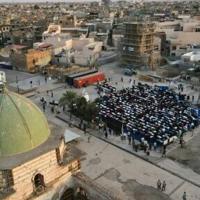A United Nations agency has uncovered five bombs in a wall of Mosul’s famous Al-Nuri mosque, which were planted years ago by Islamic State group militants, during restoration work in the northern Iraqi city.
The UNESCO team working at the site discovered five “large-scale explosive devices, designed to trigger a massive destruction of the site,” in the southern wall of the prayer hall on Tuesday, as reported by a representative for the agency to AFP late Friday.
Mosul’s Al-Nuri mosque and the adjacent leaning minaret known as Al-Hadba or the “hunchback”, dating back to the 12th century, were destroyed during the battle to reclaim the city from IS.
The Iraqi army accused IS, which controlled Mosul for three years, of planting explosives at the site and detonating it.
UNESCO, the UN cultural agency, has been engaged in the restoration of the mosque and other architectural heritage sites in the city, much of which was reduced to rubble during the battle to retake it in 2017.
The agency stated, “The Iraqi armed forces have secured the area and the situation is now fully under control.”
While one bomb has been removed, four other 1.5-kilogram (3.3-pound) devices “remain connected to each other” and are expected to be cleared in the coming days, UNESCO mentioned.
– ‘Complex manufacturing’ –
“These explosive devices were concealed inside a wall, which was specially reconstructed around them, explaining why they were not discovered when the site was cleared by Iraqi forces in 2020,” the agency added.
Iraqi General Tahseen al-Khafaji, spokesperson for the Joint Operations Command, confirmed the discovery of “several explosive devices from ISIS militants in Al-Nuri mosque.”
He stated that provincial deminers have sought help from the Defence Ministry in Baghdad to defuse the remaining explosives due to their “complex manufacturing.”
Construction at the site has been halted until the bombs are removed.
It was from Al-Nuri mosque that Abu Bakr Al-Baghdadi, the former leader of IS, declared the formation of the group’s “caliphate” in July 2014.
The jihadists seized large areas of territory in Iraq and neighboring Syria, governing with extreme brutality.
Iraqi forces, supported by a US-led coalition, liberated Mosul from IS in 2017.
The name of the Al-Nuri mosque is derived from Nureddine al-Zinki, the unifier of Syria who also ruled over Mosul for a period and ordered its construction in 1172.
The mosque was demolished and reconstructed in 1942 as part of a renovation project, with only the ancient minaret remaining from the original structure.
The ongoing restoration of Al-Nuri, primarily funded by the United Arab Emirates, is set to be completed by December 2024.
UNESCO stated that this will finally eliminate “the stigma” of IS occupation.
The minaret, which will be restored at an angle as per the locals’ request, is being reconstructed with 45,000 of the original bricks salvaged from the debris, representing only a third of the original structure.
The bomb scare at Al-Nuri was not the only surprising discovery. In January 2022, restoration teams unearthed an underground prayer room from the original 12th-century building.
tgg-ak/ysm/it






